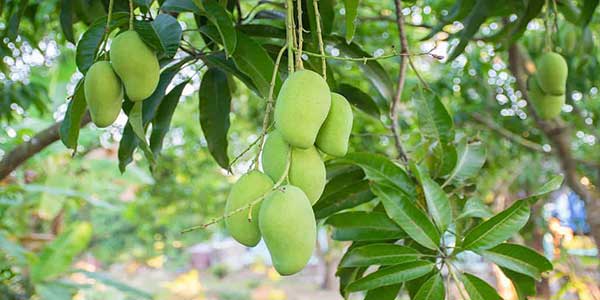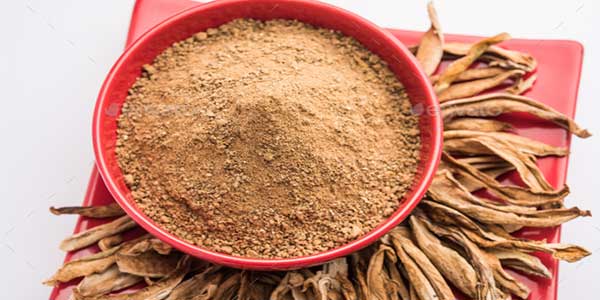Introduction:
Dried mango powder, also known as amchoor or amchur, is a tangy and citrusy spice that adds a unique flavor to a variety of dishes. Derived from raw, unripe mangoes, dried mango powder is widely used in Indian, Southeast Asian, and Middle Eastern cuisines. It offers a distinct tartness and tanginess to recipes and serves as a natural souring agent. In addition to its culinary uses, mango powder also offers several health benefits. In this comprehensive article, we will explore the uses, qualities, origin, sources, production, applications, health benefits, use in cooking, how to use mango powder, and potential side effects associated with its consumption.
Origin and Sources of Dried Mango Powder (Amchoor):
Dried mango powder has its origins in the Indian subcontinent, where raw mangoes are abundant. It is widely used in Indian cuisine and has gained popularity in other parts of the world as well. Mango powder can be found in Indian grocery stores, specialty spice shops, or purchased online.
Qualities of Dried Mango Powder (Amchoor):
Dried mango powder possesses several qualities that make it a popular ingredient in cooking. Here are some notable qualities of mango powder:
a) Flavor: Dried mango powder has a tangy, sour, and slightly sweet flavor. It adds a unique citrusy taste to dishes without overpowering other flavors. The intensity of the tanginess may vary depending on the brand and quality of the powder.
b) Aroma: Mango powder has a pleasant fruity aroma reminiscent of raw mangoes. It adds a refreshing scent to dishes and enhances their overall fragrance.
c) Texture: Dried mango powder is finely ground, resulting in a smooth and powdered texture. It easily dissolves in liquids and blends well with other spices and ingredients.
d) Color: The color of mango powder can range from pale beige to light yellow, depending on the ripeness and variety of the mangoes used. It adds a subtle hint of color to dishes.
e) Nutritional Value: Dried mango powder is low in calories and contains vitamins A, C, and E. It also provides dietary fiber and antioxidants.

Production of Dried Mango Powder (Amchoor):
The production of mango powder involves several stages, from selecting the raw mangoes to processing them into a powdered form. Here’s an overview of the production process:
a) Selection of Raw Mangoes: Raw, unripe mangoes are selected for making mango powder. The mangoes should be firm and green to ensure the desired tangy flavor.
b) Peeling and Slicing: The raw mangoes are peeled to remove the skin, and the flesh is sliced into thin pieces. The slices are then left to dry under the sun or in a dehydrator.
c) Drying: The sliced mangoes are until they become crispy and lose most of their moisture content. Sun drying may take several days, while using a dehydrator can expedite the drying process.
d) Grinding: Once the mango slices are completely dehydrated, they are ground into a fine powder. This can be done using a spice grinder or a mortar and pestle. The resulting powder is sifted to remove any coarse particles, ensuring a smooth texture.
e) Packaging: The mango powder is carefully packaged in airtight containers to protect it from moisture and maintain its freshness. Proper packaging helps to preserve its flavor and aroma for an extended period.
Uses and Applications of Dried Mango Powder (Amchoor):
Dried mango powder has a wide range of culinary applications due to its unique tangy flavor. Here are some popular uses of mango powder in cooking:
a) Flavor Enhancer: Dried mango powder is primarily used as a flavor enhancer in various dishes. It provides a sour and tangy taste that complements savory recipes, particularly in Indian cuisine. It can be added to curries, stews, soups, and chutneys.
b) Marinades and Pickles: mango powder can be incorporated into marinades and pickles to add a tangy and zesty element. It helps to tenderize the meat and infuse it with a unique flavor. It is commonly used in pickling mangoes, vegetables, and even meats.
c) Chaats and Snacks: Dried mango powder is a key ingredient in popular Indian street foods like chaats (savory snacks) and fruit salads. It is sprinkled over dishes like papdi chaat, aloo tikki, and bhel puri to provide a tangy and refreshing taste.
d) Sauces and Dips: Dried mango powder can be used in the preparation of tangy sauces and dips. It adds a sour twist to yogurt-based sauces, such as raita, and enhances the flavor of chutneys and relishes.
e) Seasoning and Spice Blends: Mango powder is used as a seasoning and a component of spice blends in Indian cooking. It is often combined with other spices like cumin, coriander, and chili powder to create flavorful masalas and curry powders.
f) Baking: Dried mango powder can be incorporated into baking recipes, particularly in cakes, cookies, and desserts. It adds a unique tanginess and balances the sweetness of the baked goods.
g) Beverages: Dried mango powder can be used to prepare refreshing beverages, such as mango lassi (a yogurt-based drink) or mango-flavored smoothies. It adds a zingy and tropical twist to the drinks.

Health Benefits of Dried Mango Powder (Amchoor):
Dried mango powder not only enhances the flavor of dishes but also offers several potential health benefits. Here are some notable health benefits associated with its consumption:
a) Digestive Health: Dried mango powder is known for its digestive properties. It can help stimulate the production of digestive enzymes, aid in digestion, and alleviate digestive disorders like bloating and indigestion.
b) Vitamin C Boost: Dried mango powder is a rich source of vitamin C, an essential nutrient that supports the immune system, promotes collagen production, and acts as an antioxidant, protecting the body against free radicals.
c) Antioxidant Properties: The presence of antioxidants in mango powder helps combat oxidative stress and may reduce the risk of chronic diseases, including heart disease and certain types of cancer.
d) Iron Absorption: Vitamin C in mango powder aids in the absorption of iron from plant-based sources. Consuming mango powder along with iron-rich foods can enhance iron absorption and help prevent iron deficiency anemia.
e) Regulating Blood Sugar: Some studies suggest that mango powder may help regulate blood sugar levels. It may improve insulin sensitivity and contribute to better blood sugar control, particularly in individuals with diabetes.
f) Skin Health: The vitamin C and antioxidants in mango powder promote healthy skin by protecting against damage from UV rays and environmental pollutants. It may help reduce signs of aging, improve skin texture, and promote a radiant complexion.
g) Alkalizing Properties: Dried mango powder has alkalizing properties, which can help balance the pH levels in the body and promote overall alkalinity. This is beneficial for maintaining optimal health and preventing acidity-related conditions.
How to Use Dried Mango Powder (Amchoor) in Cooking:
Dried mango powder can be easily incorporated into various recipes to add a tangy and citrusy flavor. Here are some tips on how to use mango powder in your cooking:
a) Seasoning: Sprinkle a pinch of mango powder over salads, roasted vegetables, or grilled meats to add a tangy kick.
b) Curries and Gravies: Add mango powder to curries, gravies, and sauces to enhance the flavor and impart a tangy taste. Start with a small amount and adjust according to your taste preferences.
c) Chutneys and Dips: Blend dried mango powder with yogurt, mint, coriander, and other ingredients to create flavorful chutneys and dips. These can be enjoyed with snacks, kebabs, or as a condiment with meals.
d) Marinades and Pickles: Incorporate mango powder into marinades for meats, poultry, or seafood. It helps to tenderize the proteins and adds a tangy flavor. It can also be used in pickling recipes for fruits, vegetables, or relishes.
e) Chaats and Snacks: Sprinkle mango powder over chaats, such as pani puri, sev puri, or bhel puri, for an authentic tangy taste. It can also be added to roasted nuts, popcorn, or roasted chickpeas for a zesty twist.
f) Beverages: Add a teaspoon of mango powder to fruit smoothies, yogurt-based drinks, or mocktails for a refreshing and tangy flavor.

Side Effects and Precautions:
While dried mango powder is generally safe for consumption, it’s important to be aware of potential side effects and take necessary precautions:
a) Allergies: Some individuals may have allergies or sensitivities to mangoes. If you experience any allergic reactions like itching, swelling, or difficulty breathing after consuming mango powder, discontinue its use and seek medical attention if necessary.
b) High Potassium Content: Dried mango powder is naturally high in potassium. Individuals with kidney problems or those following a low-potassium diet should exercise caution and limit their intake.
c) Blood Sugar Control: Although mango powder may have potential benefits for blood sugar regulation, individuals with diabetes should monitor their blood sugar levels and consult with a healthcare professional before incorporating it into their diet.
d) Quality and Purity: Ensure you purchase mango powder from reputable sources to ensure its quality and purity. Some products may contain additives or fillers, so it’s important to read the label and choose a reliable brand.
e) Moderation: Like any spice or ingredient, moderation is key. While mango powder offers flavor and potential health benefits, excessive consumption may lead to digestive discomfort or other adverse effects. Use it in recommended quantities and in combination with a balanced diet.
Conclusion:
Dried mango powder, or amchoor/amchur, is a versatile spice that adds a tangy and citrusy flavor to a wide range of dishes. From curries and marinades to chutneys and snacks, it enhances the taste and aroma of recipes. Additionally, mango powder offers potential health benefits, including supporting digestion, providing vitamin C, acting as an antioxidant, and aiding in iron absorption. However, it’s important to exercise caution if you have allergies, kidney problems, or diabetes, and to use it in moderation. Enjoy the unique qualities and flavors of mango powder by incorporating it into your cooking and exploring its culinary and potential health benefits.
Mangoes are rich in vitamins and minerals, particularly vitamin C, vitamin A, and potassium. They also contain antioxidants, which can help protect the body’s cells from damage caused by free radicals. Additionally, mangoes provide dietary fiber, which is important for digestive health. Is strange that is not considerered a super food!